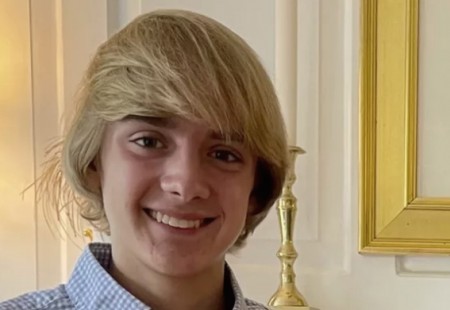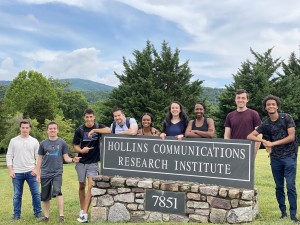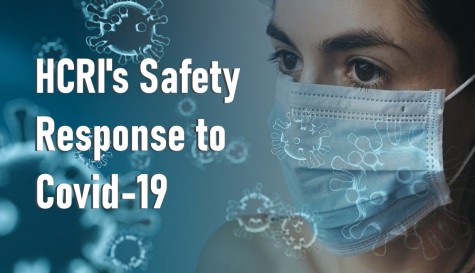As Hollins Communication Research Institute (HCRI) enters its 50th year of stuttering research and treatment innovation, here’s a summary look at the breadth of work and accomplishments of the nonprofit center.
What started in 1972 as a small, stuttering research and therapy operation in Roanoke, Virginia has evolved into an international center that has treated thousands who stutter with one of the most sophisticated and successful treatment programs available today.
- Under the direction of Founder and President, Ronald L. Webster, Ph.D, HCRI was the first to develop a comprehensive behavioral therapy for stuttering that is based on science. Since introducing the stuttering therapy program in 1972, HCRI has continually innovated and refined the therapy program by developing specialized electronics, computer software programs, detailed clinician training protocols, and technologically advanced therapy tools.
- Dr. Webster and his research team invented the Voice Monitor, a real-time, computer-based speech measurement and feedback system. The Voice Monitor makes fluency-skill learning more exacting for clients and increases clinical efficiency by 500%. A U.S. patent was awarded for the Voice Monitor.
- HCRI stuttering therapy delivers among the highest documented fluency outcomes of any stuttering treatment available. 93% of clients achieve fluency in 12 days and 75% maintain fluent speech when evaluated two years later.
- HCRI introduced the first web-based home practice tool for clients called FluencyNet, which reinforces fluency skills learned in therapy.
- HCRI introduced an iPhone app that serves as a “clinician in your pocket,” providing real-time speech feedback to stuttering therapy clients, helping them practice and stabilize newly acquired fluency skills.
- HCRI created a training program exclusively for the institute’s clinicians to ensure consistent, results-based therapy delivery. This rigorous 500-hour program surpasses any available professional training or certification in the field.
- HCRI clinicians have treated more than 7,000 individuals who stutter, aged 10 to 75, from across the U.S. and 50 countries.
Recognition
- HCRI’s stuttering treatment program was the distinguished recipient of the First Award for Scientific Merit by the American Speech-Language-Hearing Association.
- The Virginia General Assembly, during Governor Jim Gilmore’s term, unanimously passed a house joint resolution commending HCRI for its groundbreaking research and therapy innovation.
- HCRI was recognized by Virginia Business magazine for its long-standing track record of innovation.
- HCRI Founder and President Ronald L. Webster, Ph.D., a licensed clinical psychologist and Professor Emeritus of psychology, received the Outstanding Contributions in the Application of Psychology award from the Virginia Psychological Association.
Research
- HCRI partnered with the National Institute on Deafness and Other Communications Disorders (NIDCD) on a pioneering study that discovered three mutant genes that are linked to stuttering. Results of the study were published in the February 2010 issue of the New England Journal of Medicine.
- HCRI conducted a study on the genetics of stuttering and mucolipidosis in association with NIDCD, the Laboratory of Communications Disorders, and Porter Neuroscience Research Center. Findings demonstrated the two conditions are associated with different variants in the same genes. The study and its findings were published in the July 15, 2015 issue of the European Journal of Human Genetics.
- HCRI participated with the NIDCD in the first study to evaluate stuttering therapy outcomes among a group of stutterers who possess one of the mutant genes for stuttering compared to a group of stutterers who do not carry the same mutant genes. The results were published in the July/August 2019 issue of the Journal of Communications Disorders.
Published Work
- Dr. Webster has written dozens of stuttering articles and book chapters throughout his career that have appeared in publications including the Journal of Speech and Hearing Research, Journal of Fluency Disorders, Journal of Abnormal Psychology, and others.
- Dr. Webster published a comprehensive book on stuttering and treatment that offers new insights and dispels the misinformation that surround the disorder. The book is “From Stuttering to Fluent Speech, 6300 Cases Later: Unlocking Muscle Mischief.”
- He also authored an inspirational children’s story book on stuttering, “Katie: The Little Girl Who Stuttered and Then Learned to Speak Fluently.
HCRI Media Coverage
The HCRI therapy program and Dr. Webster’s work have been the subject of coverage in national, regional and local media. HCRI media coverage includes NBC Today, CBS Morning News, Good Morning America, 20/20, Nightline, New York Times, Wall Street Journal, Washington Post, Newsweek, Scientific American, Sports Illustrated, U.S. News and World Report, and many others. In addition, articles about HCRI stuttering therapy have appeared in digital outlets across the internet.
——–
About Stuttering
Approximately 66 million people worldwide suffer from the effects of stuttering, with three million in the U.S, according to NIDCD. The condition is characterized by repeated or prolonged sounds, syllables, blocks and words that disrupt speech. Stuttering can impair social growth, educational attainment, and job potential.
About HCRI
HCRI was founded by Ronald L Webster, Ph.D. in 1972 to investigate stuttering through scientific discovery and treatment innovation. Virginia-based HCRI, a 501 (c) (3) charitable organization, has become an international leader in stuttering research and the development of innovative, scientifically derived therapy approaches.
Clients come from all walks of life and include broadcasters, teachers, engineers, musicians, students, doctors, military personnel, business professionals, police officers, actors, a supreme court nominee, and even royalty.
HCRI is located at 7851 Enon Drive, Roanoke, Va. 24019. For more information, visit www.stuttering.org or contact HCRI at (540) 265-5650 or info@stuttering.org.


.jpg)
















